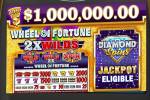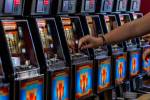Slot market looking up
So what happened to all the expected slot machine sales?
Following November's Global Gaming Expo in Las Vegas, casino operators seemed ready to loosen the half-decade-old grip they held over capital spending budgets.
The recession slowed customer casino spending, causing nationwide gaming revenues to fall 5.5 percent in 2009 following a 4.7 percent drop in 2008.
The economy, coupled with belt-tightening budget reductions, resulted in two years of declining slot machine sales. The lower game shipments came at the same time the slot builders were hoping to begin industrywide placements of the much-hyped server-based gaming technology, which cost some slot machine developers hundreds of millions dollars in research and development.
Many manufacturers had full warehouses and relied on sales in foreign markets to meet costs.
But domestic attitudes seemed to change after G2E.
Wall Street analysts and gambling equipment specialists gave high marks to the newest products the major manufacturers displayed at the trade show.
Slot machine sales were poised for a breakthrough in the first quarter of 2010. Gaming equipment companies were lining up the delivery trucks with new games and were prepared to refresh tired slot machine floors nationwide that hadn't been updated since ticket in-ticket out games replaced coin-based models.
So what happened?
"The sales just didn't materialize," Bally Technologies Chief Operating Officer Gavin Isaacs said. "Everybody left the show positive they were going to spend more. But the attitudes changed and the sales figures never came through."
Some analysts warned early in the year that sales might not meet predictions. Goldman Sachs, in its annual survey of casino slot managers found that a majority were not interested in buying new games. Those same managers thought server-based gaming system deployment was at least four years away.
"Floors are due to be updated, but may not be until new capital is available or there is a technological reason to so," Goldman Sachs gaming analyst Steven Kent said.
It wasn't until Las Vegas-based Bally preannounced earnings in early April, saying slower-than-expected slot sales would drive earnings per share 12 percent lower than the company had projected, that the industry admitted 2010 could be as challenging as 2009.
"There was a period of optimism after G2E that quickly went away," Isaacs said.
However, almost six months into 2010, the optimism has returned.
Gaming analysts who attended three recent trade shows -- the National Indian Gaming show in San Diego in early April, the Canadian Gaming Summit in Calgary, Alberta, in late April, and the Southern Gaming Summit in Biloxi, Miss., in early May -- walked away with the same opinion they had in November; casino operators might be ready to purchase new games and update their slot machine offerings.
The products displayed were some of the same games offered in November. But with several gaming markets showing positive movement -- through March, gaming revenues are up 3 percent in Nevada and 9.8 percent on the Strip -- sales could materialize.
"Based on our conversations, we look for modest quarter-over-quarter improvement in (capital expenditure) spending in the June quarter due to a combination of seasonality and slightly improved revenue trends in key markets," Roth Capital Partners gaming analyst Todd Eilers told investors.
Macquarie Securities gaming analyst Joel Simkins said after the Southern Gaming Summit that regional market casino operators realize they have stale slot floors and need re-energize their game offerings with new machines.
However, he didn't expect slot machine sales to shoot through the roof.
"The pace of the replacement cycle has not materially changed," Simkins said. "The outlook for 2011 should continue to improve as more and more (casino operators) are showing increased signs of interest or willingness to lock into master purchasing agreements."
Some analysts are focused on the video lottery terminal market as a potential growth platform.
VLTs, which look and operate similar to the way slot machines do, generate jackpots and payouts from a central server rather than a random number generator. Many VLTs are operated through government-run gaming systems, such as Canadian provinces.
Several markets, including Illinois, Maryland and New York, are looking to add VLTs into both new locations and existing facilities.
New York state, for example, wants to add 4,500 VLTs to the Aqueduct Race Track in New York City.
Illinois has approved adding games to bars and taverns throughout the state, which could total 30,000 machines. It's up to each county to approve the plan.
Isaacs said VLTs offer Bally the best opportunity to increase sales on the immediate horizon.
Because the games are linked together, more machines are usually sold at once. The price per game, however, more often comes with a discount to the buyer.
Still, Isaacs said Bally has been able to increase its market share. The company recently signed long-term agreements with two of Italy's VLT concessionaires to provide 3,600 machines to the country's new VLT program which is expected to include some 60,000 machines.
"The business is a good model for us," Isaacs said. "There is lot of potential in the VLT area and you're crazy if you don't take advantage of those opportunities when they arise."
Janney Montgomery Scott gaming analyst Brian McGill said in the short term, equipment manufacturers may find the going tough. Looking ahead through 2012, however, there are potential gaming expansion plans that could result in almost 103,000 slot machines added to the market as both new games and replacements through 2012.
McGill said his figures don't include new casinos being discussed in Mississippi, Louisiana and Kansas.
"The pipeline is finally starting to show growth," McGill said. "Projects have broken ground and firmed up opening dates."
Canada, McGill said, offers a large potential for VLT sales. The country has 36,000 VLTs now in operation and several provinces have taken steps to begin replacing older games and systems.
Quebec plans to replace all 12,000 of its VLTs, Alberta is considering changing out 5,500 games while Manitoba could replace its 5,600 machines over the next five years.
"All of these replacements come in addition to the normal replacement activity that take place from the casinos and racinos throughout the country," McGill said. "We believe this creates a meaningful earnings per share driver for (International Game Technology, Bally and WMS Industries)."
Contact reporter Howard Stutz at hstutz@reviewjournal.com or 702-477-3871.





























